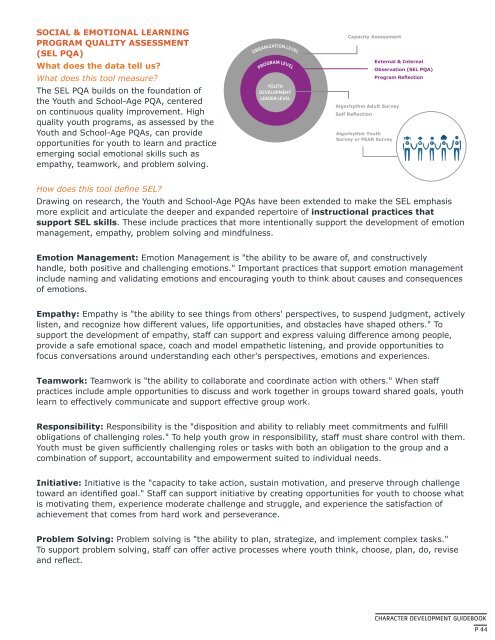CDLI_Guidebook_18_Final_Print
You also want an ePaper? Increase the reach of your titles
YUMPU automatically turns print PDFs into web optimized ePapers that Google loves.
SOCIAL & EMOTIONAL LEARNING<br />
PROGRAM QUALITY ASSESSMENT<br />
(SEL PQA)<br />
What does the data tell us?<br />
What does this tool measure?<br />
The SEL PQA builds on the foundation of<br />
the Youth and School-Age PQA, centered<br />
on continuous quality improvement. High<br />
quality youth programs, as assessed by the<br />
Youth and School-Age PQAs, can provide<br />
opportunities for youth to learn and practice<br />
emerging social emotional skills such as<br />
empathy, teamwork, and problem solving.<br />
ORGANIZATION LEVEL<br />
PROGRAM LEVEL<br />
YOUTH<br />
DEVELOPMENT<br />
LEADER LEVEL<br />
Capacity Assessment<br />
Algorhythm Adult Survey<br />
Self Reflection<br />
Algorhythm Youth<br />
Survey or PEAR Survey<br />
External & Internal<br />
Observation (SEL PQA)<br />
Program Reflection<br />
How does this tool define SEL?<br />
Drawing on research, the Youth and School-Age PQAs have been extended to make the SEL emphasis<br />
more explicit and articulate the deeper and expanded repertoire of instructional practices that<br />
support SEL skills. These include practices that more intentionally support the development of emotion<br />
management, empathy, problem solving and mindfulness.<br />
Emotion Management: Emotion Management is "the ability to be aware of, and constructively<br />
handle, both positive and challenging emotions." Important practices that support emotion management<br />
include naming and validating emotions and encouraging youth to think about causes and consequences<br />
of emotions.<br />
Empathy: Empathy is "the ability to see things from others' perspectives, to suspend judgment, actively<br />
listen, and recognize how different values, life opportunities, and obstacles have shaped others." To<br />
support the development of empathy, staff can support and express valuing difference among people,<br />
provide a safe emotional space, coach and model empathetic listening, and provide opportunities to<br />
focus conversations around understanding each other's perspectives, emotions and experiences.<br />
Teamwork: Teamwork is "the ability to collaborate and coordinate action with others." When staff<br />
practices include ample opportunities to discuss and work together in groups toward shared goals, youth<br />
learn to effectively communicate and support effective group work.<br />
Responsibility: Responsibility is the "disposition and ability to reliably meet commitments and fulfill<br />
obligations of challenging roles." To help youth grow in responsibility, staff must share control with them.<br />
Youth must be given sufficiently challenging roles or tasks with both an obligation to the group and a<br />
combination of support, accountability and empowerment suited to individual needs.<br />
Initiative: Initiative is the "capacity to take action, sustain motivation, and preserve through challenge<br />
toward an identified goal." Staff can support initiative by creating opportunities for youth to choose what<br />
is motivating them, experience moderate challenge and struggle, and experience the satisfaction of<br />
achievement that comes from hard work and perseverance.<br />
Problem Solving: Problem solving is "the ability to plan, strategize, and implement complex tasks."<br />
To support problem solving, staff can offer active processes where youth think, choose, plan, do, revise<br />
and reflect.<br />
CHARACTER DEVELOPMENT GUIDEBOOK<br />
P 44



